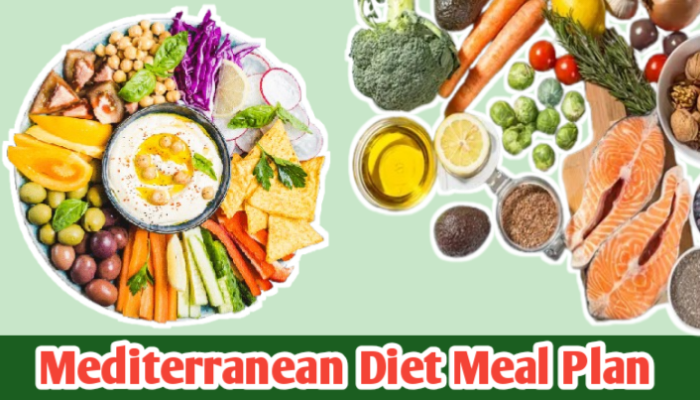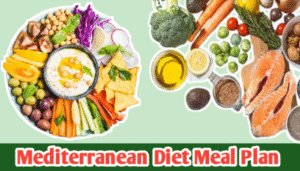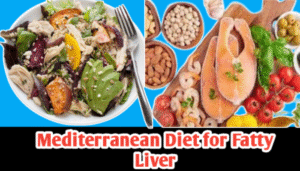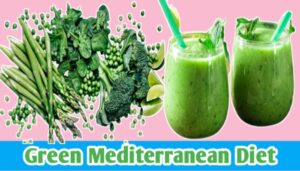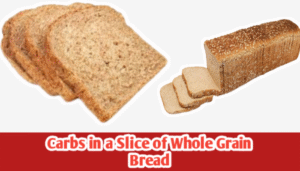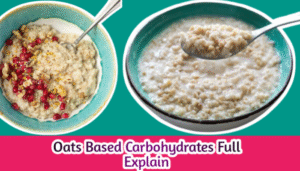Mediterranean Diet Meal Plan is inspired by the traditional eating patterns of countries bordering the Mediterranean Sea, including Greece, Italy, and Spain. It emphasizes whole, minimally processed foods, rich in plant-based ingredients, healthy fats, and lean proteins.
Unlike fad diets, the Mediterranean approach is flexible, sustainable, and lifestyle-oriented, focusing not just on what you eat, but how you eat—sharing meals with family, enjoying flavors, and embracing moderation.
1. Health Benefits of the Mediterranean Diet
The Mediterranean diet is widely recognized for its health-promoting properties. Here’s a detailed breakdown:
1.1 Heart Health
- Rich in monounsaturated fats (olive oil) and omega-3 fatty acids (fish, nuts).
- Reduces bad cholesterol (LDL) while increasing good cholesterol (HDL).
- Lowers risk of heart disease, stroke, and hypertension.
1.2 Weight Management
- Emphasizes fiber-rich fruits, vegetables, and whole grains that promote satiety.
- Helps maintain a healthy weight without strict calorie counting.
1.3 Diabetes Management
- High fiber and low glycemic index foods help stabilize blood sugar levels.
- Can improve insulin sensitivity and reduce the risk of type 2 diabetes.
1.4 Cognitive Function
- Antioxidant-rich foods (berries, leafy greens, olive oil) support brain health.
- Reduces risk of cognitive decline and neurodegenerative diseases.
1.5 Longevity
- Studies link Mediterranean eating patterns to longer life expectancy and lower risk of chronic diseases.
2. Core Principles of the Mediterranean Diet
The Mediterranean diet is not a strict regimen, but a set of principles that guide healthy eating:
2.1 Emphasis on Fruits and Vegetables
- Aim for 5–10 servings per day.
- Include a variety of colors for antioxidants and phytonutrients.
2.2 Whole Grains
- Prefer brown rice, quinoa, oats, whole-wheat bread, and pasta.
- Provides fiber, energy, and essential micronutrients.
2.3 Healthy Fats
- Primary fat source: extra virgin olive oil.
- Include nuts, seeds, and avocados for heart-healthy monounsaturated and polyunsaturated fats.
2.4 Lean Proteins
- Focus on fish (salmon, sardines, tuna), legumes (beans, lentils), and moderate poultry.
- Limit red meat to occasional consumption.
2.5 Limited Processed Foods & Sugar
- Minimize processed snacks, sugary drinks, and refined grains.
- Enjoy desserts occasionally, preferably fruit-based.
2.6 Herbs & Spices
- Use fresh herbs, garlic, oregano, basil, and spices instead of salt for flavor.
3. Mediterranean Diet Food Groups
A balanced Mediterranean meal combines all essential food groups:
3.1 Fruits & Vegetables
- Examples: Tomatoes, spinach, broccoli, zucchini, bell peppers, berries, citrus fruits.
- Benefits: Rich in fiber, vitamins, antioxidants, and low in calories.
3.2 Whole Grains
- Examples: Brown rice, oats, quinoa, barley, whole-wheat pasta.
- Benefits: Sustained energy, digestive health, and nutrient density.
3.3 Lean Proteins
- Examples: Fish, shellfish, legumes, beans, lentils, eggs (moderation).
- Benefits: Supports muscle maintenance, satiety, and overall metabolic health.
3.4 Healthy Fats
- Examples: Olive oil, nuts, seeds, avocado.
- Benefits: Heart health, anti-inflammatory properties, and better nutrient absorption.
3.5 Herbs and Spices
- Examples: Basil, oregano, thyme, rosemary, garlic.
- Benefits: Antioxidants, reduced sodium intake, enhanced flavor.
4. Daily Meal Structure in a Mediterranean Diet
A Mediterranean diet focuses on balanced, flavorful meals throughout the day:
4.1 Breakfast
- Greek yogurt or plant-based yogurt with fruits and nuts.
- Whole-grain toast with avocado and olive oil drizzle.
4.2 Lunch
- Large salad with leafy greens, cherry tomatoes, cucumbers, olives, chickpeas, and olive oil dressing.
- Whole-grain bread or small serving of brown rice/quinoa.
4.3 Dinner
- Grilled fish or baked tofu/tempeh with roasted vegetables.
- Side of whole grains or legumes.
4.4 Snacks
- Fresh fruits, nuts, hummus with veggie sticks, olives.
- Small portions maintain energy and prevent overeating at main meals.
5. Mediterranean Diet Recipes
Practical recipes make the diet easy and enjoyable:
5.1 Breakfast Recipes
- Mediterranean Avocado Toast: Whole-grain bread topped with mashed avocado, cherry tomatoes, olive oil, and oregano.
- Greek Yogurt Bowl: Yogurt with mixed berries, walnuts, chia seeds, and honey.
5.2 Lunch Recipes
- Chickpea & Quinoa Salad: Quinoa, chickpeas, cucumber, cherry tomatoes, parsley, olive oil, lemon juice.
- Mediterranean Grain Bowl: Brown rice, roasted vegetables, olives, tahini drizzle.
5.3 Dinner Recipes
- Grilled Salmon with Veggies: Salmon fillet with zucchini, bell peppers, and olive oil.
- Lentil Stew: Lentils, carrots, tomatoes, onions, garlic, and Mediterranean herbs.
5.4 Snack Recipes
- Hummus with Veggie Sticks: Carrots, celery, cucumber dipped in homemade hummus.
- Mixed Nuts & Dried Fruit: Almonds, walnuts, apricots, figs.
6. Tips for Sticking to a Mediterranean Diet
6.1 Meal Prep Strategies
- Batch cook whole grains and roasted vegetables.
- Portion legumes and proteins for easy access.
6.2 Grocery Shopping Tips
- Focus on fresh produce, whole grains, nuts, seeds, and olive oil.
- Limit processed foods; read labels for added sugar and refined grains.
6.3 Eating Out Guidance
- Choose grilled fish or vegetable dishes.
- Prefer salads, whole-grain sides, and olive oil dressings.
- Avoid fried foods and sugary beverages.
6.4 Include Variety & Color
- Rotate fruits, vegetables, grains, and proteins each week.
- Ensures coverage of all essential vitamins, minerals, and antioxidants.
6.5 Mindful Eating
- Enjoy meals slowly, share with family or friends, savor flavors.
- Portion control and moderation are key principles of the diet.
7. Common Mistakes to Avoid
- Overconsumption of cheese or processed foods.
- Skipping fruits, vegetables, or whole grains.
- Relying heavily on refined grains or fried foods.
8. Conclusion
The Mediterranean diet is flexible, flavorful, and backed by science for long-term health. By emphasizing whole grains, fruits, vegetables, healthy fats, and lean proteins, and practicing moderation and mindful eating, anyone can adopt this lifestyle for heart health, longevity, and overall wellness.
